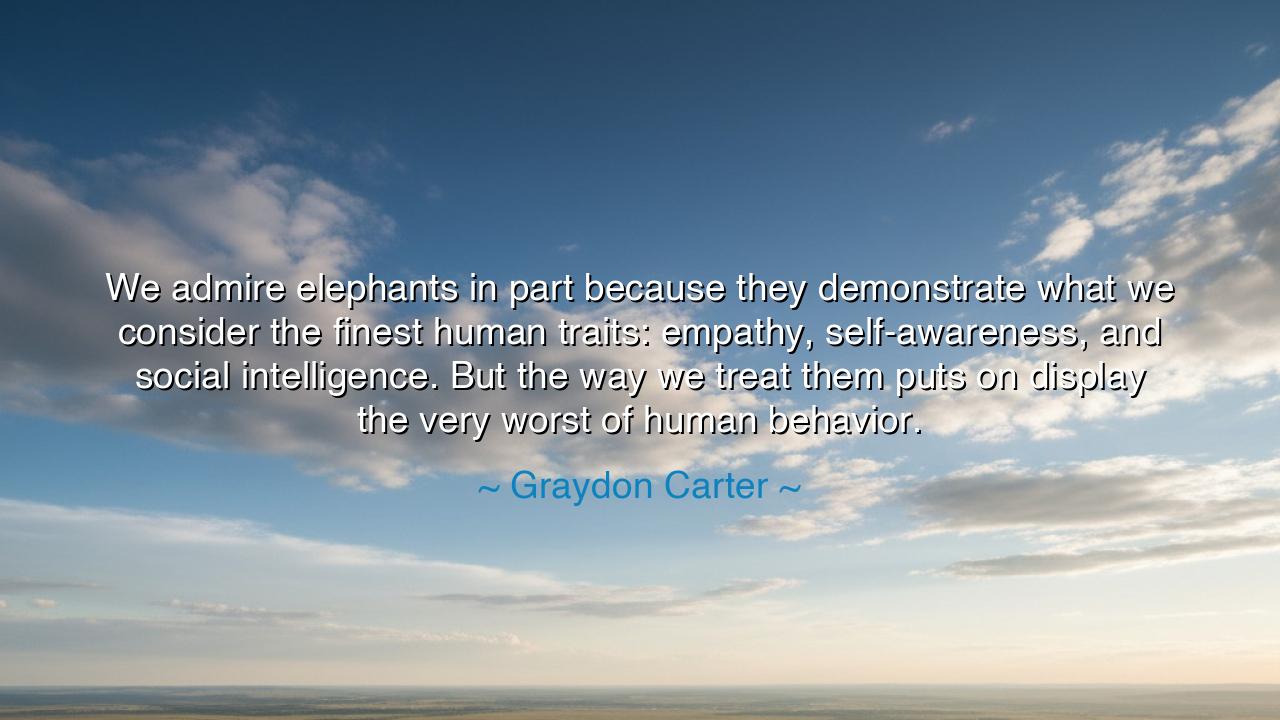
We admire elephants in part because they demonstrate what we
We admire elephants in part because they demonstrate what we consider the finest human traits: empathy, self-awareness, and social intelligence. But the way we treat them puts on display the very worst of human behavior.






The Mirror of the Elephant
In the words of Graydon Carter, a truth both sorrowful and sublime resounds: “We admire elephants in part because they demonstrate what we consider the finest human traits: empathy, self-awareness, and social intelligence. But the way we treat them puts on display the very worst of human behavior.” This is no mere lament for the suffering of a beast—it is a mirror held to mankind, revealing both our capacity for reverence and our appetite for cruelty. For the elephant, noble and ancient, stands as one of Earth’s oldest teachers—a creature that feels as we feel, grieves as we grieve, and yet is hunted, chained, and broken by the very hands that praise its majesty.
The meaning of this quote unfolds in two currents: admiration and hypocrisy. We look upon the elephant and see the reflection of our highest ideals—empathy, self-awareness, intelligence. In its eyes shines gentleness; in its herd, loyalty; in its mourning, the sacred recognition of life’s bond. Yet this same creature, that embodies the virtues we claim to cherish, suffers by our design. The hand that writes poetry about compassion also strikes the whip. The lips that call the elephant “wise” also silence its cry. Thus, Carter’s words pierce to the core of our moral contradiction: we honor what we destroy, and in doing so, expose the fracture in the human soul.
From the dawn of civilization, the elephant has walked beside us as both ally and symbol. In the temples of India, it was the living image of Ganesha, remover of obstacles and guardian of wisdom. In the armies of the ancient world, elephants carried kings into battle, towering like living fortresses. Yet even as we revered their strength, we enslaved it. We adorned their heads with gold while binding their feet with chains. The Romans made them spectacles in their circuses; the modern world confines them to circuses still, only with brighter lights and colder hearts. This is the paradox of mankind—our reverence without mercy, our love without justice.
There is a story told of Lawrence Anthony, the “Elephant Whisperer” of South Africa, who rescued a herd of wild elephants marked for death. When he died, years later, the herd—miles away in the wilderness—began a solemn journey. For two days, they walked to his home and stood silently at his gate, as if in mourning for their friend. They had not seen him for over a year, yet they came as though drawn by an invisible thread of empathy and remembrance. If such creatures can grieve, then they can love. And if they can love, then the weight of our cruelty is far heavier than we admit. For when we harm them, we wound not only the animal but the better part of ourselves.
Carter’s words therefore call us to a higher awareness—to recognize that the measure of our civilization is found not in our monuments or machines, but in how we treat the gentle and the voiceless. To exploit the elephant is to desecrate a temple of life. To protect it is to honor the divine spark that connects all living things. The empathy of the elephant is not weakness—it is wisdom. Its social intelligence is not mere instinct—it is proof that compassion is woven into the fabric of consciousness itself. And yet, in cages and poacher’s traps, that same wisdom is met with bullets. The lesson is not only about animals, but about us—for every act of violence toward nature diminishes the human spirit.
The ancients taught that man was the steward of creation, not its tyrant. When the balance is broken, both the earth and the heart decay. The elephant, with its vast memory and serene strength, reminds us of what we were meant to be: caretakers, not conquerors. To respect life is to preserve one’s own humanity; to destroy it is to fall beneath the level of the beasts we despise. Thus, when we gaze into the eyes of an elephant, we should see not an animal to exploit, but a mirror reflecting what we could become—wise, gentle, enduring, and whole.
Let this teaching be carried forward: Honor the life that mirrors your own. Stand against the cruelty that mocks compassion. Protect the creatures that trust in your mercy, for their survival is bound to yours. Seek not dominion, but harmony; not ownership, but kinship. For in learning to love the elephant rightly, we learn to love ourselves rightly. And when humanity at last learns to treat the world’s gentlest giants with reverence, perhaps we shall have reclaimed our own lost greatness.
Then the earth will heal, and the rain that falls upon our dreams will no longer be a storm of cruelty, but a baptism of compassion—cleansing the human heart until it is worthy, once again, to walk beside the elephant in peace.






AAdministratorAdministrator
Welcome, honored guests. Please leave a comment, we will respond soon